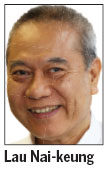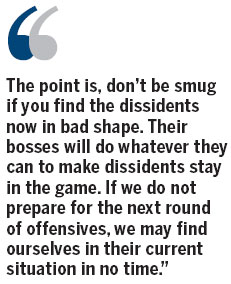Opposition's latest move to reverse political trends
Updated: 2013-09-24 07:07
By Lau Nai-keung(HK Edition)
|
|||||||
On Sept 14, a day before the International Day of Democracy, British Foreign Office Minister of State Hugo Swire said in a newspaper opinion piece "Britain stands ready to support (Hong Kong's political reform) in any way we can." This happened half a month after Song Zhe, Beijing's top diplomat in Hong Kong, told US Consul-General Clifford Hart that our city's constitutional development is none of the US's business.
Foreign intervention in Hong Kong's politics is nothing new. What intrigues me is the recent high-profile moves that the US and the UK must know would certainly agitate Beijing. A day after he took up the post on July 30, Hart said he was looking forward to Hong Kong's move towards "genuine democratic suffrage". Next, we saw him eating egg tarts and visiting Taoist temples Christopher Patten-style.
The US can continue to work behind proxies like it always has, funding individuals and groups, training them and giving them instructions. Why go front stage all of a sudden?
Perhaps it has to do with the fact that "Occupy Central" is not going as smoothly as planned. The movement's Facebook page now has 41,000 likes, and grows on average by 400 per week since the post-launch spike. The number pales in comparison to the Scholarism movement's page, which got more than 100,000 likes shortly after the group was publicized by the media.

At the same time, the Silent Majority for HK has reached almost 13,000 likes, and is getting 200 per week. This is the first time a pro-establishment's counter campaign has got that close. Previously Scholarism's opponents in the patriotic education episode only got a little more than 5,000 likes. This is as good as it got for mobilizing the silent majority.
Forums organized by "Occupy Central" have seen embarrassing turnouts. A poll conducted by the Hong Kong Institute of Education in March showed respondents prefer order to democracy. All these signs and many more point to one conclusion: "Occupy" is not very popular here.
But this is to be expected. In fact, "Occupy" can be viewed as a sign of the opposition's demise. Four major trends in Hong Kong's politics have to be considered. First, pro-British elites constructed by the colonial government in the 1970s and 1980s will soon become obsolete. This cohort had the opportunity to participate in the city's first wave of democratization, and therefore has remained a heavyweight in the dissident camp.
Second, the pro-establishment camp is catching up in elections. Sooner or later, the dissident camp will lose its "critical minority" veto power in the Legislative Council (LegCo).

Third, old political icons, including Tiananmen Square, are losing effectiveness as younger generations come of age.
Fourth, the central government and the SAR government are slowly gaining legitimacy in Hong Kong. If the 2017 election is accepted as "genuinely democratic", the dissidents will lose further leverage.
All these trends work against the dissidents (and the foreign forces that support them), and they are clearly aware of these threats. In essence, "Occupy" is an attempt to reverse these trends. It uses the last batch of the aging moderate elites to fuel the city's budding radicalism, de-institutionalize politics by discrediting LegCo and giving primacy to mass sit-ins. It tries to recast Central as a new political symbol, and pre-empt the boost in legitimacy that universal suffrage in 2017 would create.
"Occupy" is doomed to fail in its stated objectives. Whether it can achieve its ulterior intention - to rebalance the political landscape in Hong Kong to the opposition's advantage - remains to be seen.
The point is, don't be smug if you find the dissidents now in bad shape. Their bosses will do whatever they can to make dissidents stay in the game. If we do not prepare for the next round of offensives, we may find ourselves in their current situation in no time.
One of the things we should do is grab the golden opportunity provided to us by Hugo Swire. Democracy in Hong Kong is, to a certain extent, a veiled class struggle, but there is also an element of nationalism that has always been muted. Now the SAR government must emphasize that in addition to "equal representation" among Hong Kong's citizens, the design (not mere principles, but embedded in practice) of universal suffrage in 2017 must also uphold the integrity of the sovereign.
The author is a member of the Commission on Strategic Development.
(HK Edition 09/24/2013 page1)